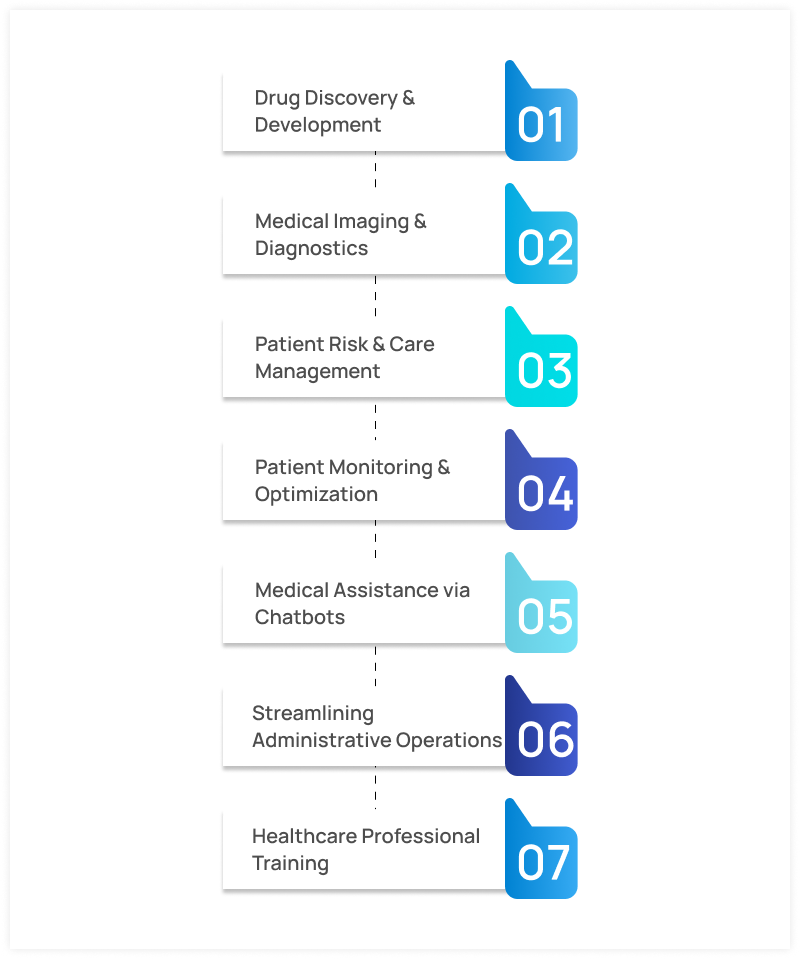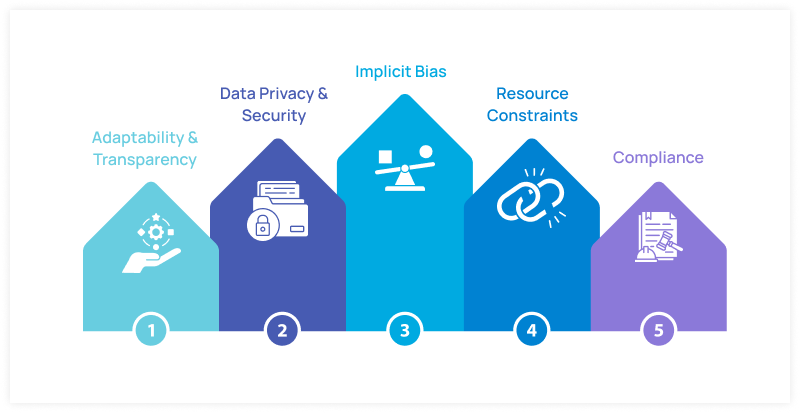An Overview of Generative AI in Healthcare
Generative Artificial Intelligence (GenAI) is evolving at an unprecedented rate, delivering transformative business value to an array of industries. Especially for sectors like healthcare, GenAI presents advanced capabilities that can change every facet of operations. By synthesizing and analyzing vast amounts of medical data, GenAI models offer insights, predict outcomes, and create solutions that can solve real healthcare challenges. Right from disease prediction and diagnostics to treatment and optimization, GenAI facilitates profound support in modernizing healthcare systems.
A report from McKinsey & Company denotes that GenAI in healthcare can unlock 1 trillion in improvement potential for the healthcare industry. By presenting its effectiveness in various areas of healthcare practices, GenAI can expedite diagnosis, offer personalized patient care, streamline administrative tasks, improve clinical productivity, and more.
In this blog, we will outline the emerging impact of generative AI in healthcare and medicine. By highlighting real-world applications, deployment benefits, and implementation challenges, we will underscore the GenAI advancements that are ushering in tangible outcomes in terms of medical research, clinical operations, patient care, back-office tasks, and treatment.
How Generative AI in Healthcare is Transforming the Sector
A McKinsey report suggests that GenAI holds the highest potential to transform the healthcare sector as opposed to other emerging technologies. Therefore, it is vital to understand how GenAI is pioneering progress for patients and healthcare providers. Let’s explore how GenAI is transforming the healthcare industry:

Patient Care
Traditional patient care often faces major challenges such as misdiagnosis, physician fatigue, tech limitations, and resource limitations. By democratizing innovation and supporting physicians in diagnosis and care, generative AI in healthcare can tackle all these challenges. As a supporting solution for healthcare professionals, GenAI models leverage public data sets and medical records to provide accurate clinical assessments, tailoring personalized treatment for each patient interaction. Additionally, these models can also predict chronic diseases and their progressions, enabling doctors to take swift action to manage their conditions.
Research
Another key area that GenAI has nascent potential is medical research, particularly clinical trials. Drug research often involves time, resources, and cost-effective operations, which are conducted to determine the best possible medications for a particular treatment. GenAI in medical research proves to be instrumental in streamlining the research procedures and eliminating errors. From screening patients for human trials to drug discovery and reducing drug failures, GenAI can play a vital role in accelerating drug development.
Administrative Functions
One of the essential ways GenAI is improving medicine is by streamlining back-office procedures. With a severe need for support in administrative tasks such as scheduling appointments, finding experts, or answering other healthcare-related queries, organizations constantly struggle to keep up with customer demands. By allowing GenAI solutions to take over these tasks, healthcare organizations can free up resources and simplify access to such services.
Medical Education
The contemporary structure of medical education demands deep knowledge, training, and clinical expertise. GenAI’s integration into the curriculum can transform how we approach learning in healthcare and medicine. Through AI-driven virtual learning platforms, simulations, and personalized learning, medical students and healthcare professionals can gain extensive training and knowledge at all levels.
For example, leading medical schools like Harvard Medical School (HMS) have already made AI an integral part of training to educate residents and students on the evolving landscape of healthcare. This adoption marks a seismic shift in inculcating clinical reasoning, critical thinking, diagnostic skills, and patient interaction skills.
Real-world Applications of Generative AI in Healthcare
Now that we’ve explored the core areas in healthcare where generative AI holds immense potential let’s dive into some real-world use cases and their impact on medical outcomes:

Drug Discovery & Development
Many pharma companies are already leveraging generative AI in medicine to accelerate drug development and clinical research. By simulating chemical structures and forecasting their efficacy, GenAI models are able to find new molecules for therapeutics. Other key areas where GenAI is conducive to drug research include target identification and validation, compound generation, simulation of drug interactions, and predicting adverse effects.
Medical Imaging & Diagnostics
When it comes to diagnosis and disease detection, GenAI augments clinical examination and medical interventions. Assisting in enhancing the accuracy of medical imaging such as X-rays, MRIs, CT scans, and their analysis, GenAI enables healthcare professionals to diagnose and identify diseases at an early stage. Its extended application includes image enhancement, augmentation, pathology prediction, image synthesis, and clinical decision support.
Patient Risk & Care Management
On the treatment and caregiving front, GenAI is formidable in creating risk and care mitigation solutions. By utilizing patients’ medical data, GenAI models can predict disease progression, risk levels, and other factors, which can help provide suitable care for better outcomes. In addition, predictive analytics can also help in resource allocation and scenario planning that can assist in a proactive care approach.
Patient Monitoring & Optimization
Aligning real-time patient conditions with personalized care can offer invaluable support to patients’ recovery journeys. In this regard, GenAI-powered solutions can be used for real-time monitoring of vital signs and other critical parameters. With continuous monitoring to identify potential issues, health institutions can tailor remedies and approaches that are relevant and effective.
Medical Assistance via Chatbots
Caregiving is evolving beyond conventional patient engagement and support, leading to a more accessible and convenient therapeutic approach. Generative AI in medicine is ushering in a new era of assistance that provides medical support virtually. Through AI Agents and Chatbots, GenAI is changing clinical consulting, patient and medication management, communications, and companionship. Furthermore, GenAI is tackling the longstanding barrier to effective and reliable clinical support, redefining the way healthcare is delivered.
Streamlining Administrative Operations
Administrative burden for medical staff is a grave concern in the healthcare sector. To address this, medical institutions are relying on GenAI-powered solutions. AI-driven integration for optimizing appointment scheduling, clinical documentation, billing, patient outreach, and compliance is reducing inefficiencies and freeing up valuable staff time.
Healthcare Professional Training
The use of GenAI for educational initiatives is vast and expanding. With personalized learning paths, practice sessions, and access to updated medical knowledge, GenAI models can give real-time feedback, which helps in skill development and ensures healthcare professionals stay proficient and up-to-date.
Apart from these use cases, some other notable mentions are resource optimization, prior authorization for insurance endeavors, pharmacovigilance, and population health management.
Key Challenges in Deploying Generative AI in Healthcare
While implementing generative AI in healthcare holds immense promise for unlocking its full potential, it also presents unique challenges. Here’s a brief rundown:

Adaptability & Transparency
The deployment of GenAI models and solutions comes with a steep learning curve. Healthcare professionals often find this challenging and require robust training in essential AI skills to navigate and effectively utilize these technologies.
Data Privacy & Security
Leveraging vast amounts of patient-sensitive data is imperative to build & train effective GenAI models. This reliance on personal medical data creates a significant concern on the security and privacy front. Additionally, handling this data and the potential implications of its violations is a critical issue that requires strict security and protection.
Implicit Bias
The outcome of AI models reflects the data they are trained on, which can inadvertently incorporate existing biases from past data, leading to unfair or skewed results. This can perpetuate or amplify biases, affecting the accuracy and fairness of AI-driven decisions in healthcare.
Resource Constraints
Integrating GenAI-powered solutions into healthcare requires specialized expertise in both medicine and artificial intelligence. A lack of this blend results in an operational and adoption gap. Hence, medical organizations should invest in AI skill development, which simplifies the usage of generative AI solutions across operations.
Compliance
As GenAI becomes an integral part of healthcare operations, it faces strict regulatory scrutiny and compliance requirements. With data protection laws and regulations in place, medical institutions should traverse the regulatory landscape and ensure that their AI implementation adheres to the necessary standards.
Future of Generative AI in Healthcare & Medicine
As the healthcare and medical fields continue to embrace the potential of generative AI, new opportunities are rapidly emerging. In the near future, GenAI will work alongside other advanced technologies such as augmented reality, virtual reality, and IoT devices, enhancing capabilities for predictive diagnostics, personalized treatments, and more accurate simulations in medical research and patient care. These advancements are poised to drive innovation, improve operations, and bring a future marked by transformative breakthroughs.
Advancing Healthcare Operations with LatentView Analytics
LatentView Analytics is a pioneering force in business analytics solutions that guides organizations across sectors toward data-driven excellence. With extensive expertise in implementing AI and analytics solutions for healthcare providers, pharmaceutical companies, and medical device manufacturers, we offer innovative insights that drive operations, enhance patient care, and support research advancements.
Ready to integrate analytics solutions into your healthcare systems? Connect with our experts to unlock the future of intelligent, patient-centered operations with the power of GenAI.
Unlock the Power of Generative AI in Healthcare Operations
"*" indicates required fields

